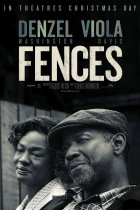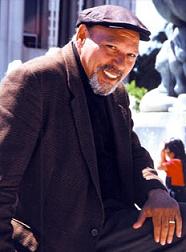
Fences Page #12
bono:
A lot of them did. Back in those days what youtalking about . . . they walk out their front
door and just take on down one road or another and
keep on walking.
lyons:
There you go! That’s what I’m talking about. There you go! That’s what I’m talking about.Troy offers Bono the bottle.
bono:
Just keep on walking till you come to somethingelse. Ain’t you never heard of nobody having the
walking blues? Well, that’s what you call it when
you just take off like that.
troy:
My daddy ain’t had them walking blues! What youtalking about? He stayed right there with his
family. But he was just as evil as he could be.
My mama couldn’t stand him. Couldn’t stand that
evilness. She run off when I was about eight.
EXT. AN ALABAMA COTTON FIELD—DAY
A sharp colorless memory fragment:
troy’s father, a sharecropper, seen from behind as
he steers a plow pulled by a mule.
troy (v.o.):
She sneaked off one night after he hadgone to sleep. Told me she was coming back for me.
I ain’t never seen her no more. All his women run
off and left him. He wasn’t good for nobody.
EXT. THE BACKYARD—AFTERNOON
troy:
When my turn come to head out, I was fourteenand got to sniffing around Joe Canewell’s daughter.
INT. THE KITCHEN—AFTERNOON
Rose sits next to Gabriel, eating a
sandwich, his trumpet on the table.
Rose is listening to Troy.
troy (o.s.):
Had us an old mule we called Greyboy. Mydaddy sent me out to do some plowing and I tied
up Greyboy and went to fooling around with Joe
Canewell’s daughter. We done found us a nice
spot, got real cozy with each other. She about
thirteen and we done figured we was grown anyway
. . . So we down there enjoying ourselves
. . . ain’t thinking about nothing.
Memory fragment, no color: The arms,
shoulders, legs of a teenaged girl,
pushing aside low-growing new foliage,
lying down on leaves; a quick glimpse
of a pretty face; her laughter heard
underneath Troy’s voice:
troy (v.o.):
We didn’t know Greyboy had got loose andwandered back to the house and my daddy was looking
for me. We down there by the creek enjoying
ourselves when my daddy come up on us.
EXT. BACKYARD—AFTERNOON
troy:
Surprised us. He had them leather straps off themule and commenced to whupping me like there was
no tomorrow. I jumped up, mad and embarrassed. I
was scared of my daddy.
Memory fragment:
Troy’s father’s hugearms tearing at branches, scrabbling
after something that’s scrambling away
from his grasping hands.
EXT. THE BACKYARD—AFTERNOON
troy:
When he commenced to whupping on me . . . quitenaturally I run to get out of the way. Now I
thought he was mad ’cause I ain’t done my work.
But I see where he was chasing me off so he could
have the gal for himself. When I see what the
matter of it was, I lost all fear of my daddy.
Right there is where I become a man . . . at
fourteen years of age.
Memory fragment:
The teenaged girl,running, terrified, deeper into the
woods; Troy’s father’s back, his shirt
being torn open by the stroke of a
leather reins; his arms raised against
further lashing.
troy (v.o.):
Now it was my turn to run him off. Ipicked up them same reins that he had used on me.
I picked up them reins and commenced to whupping
on him. The gal jumped up and run off . . . and
when my daddy turned to face me, I could see why
the devil had never come to get him . . .
Troy’s father grabs the reins,
lowering his arms; a moment in which
we see his face for the first time.
troy (v.o.):
. . . ’cause he was the devil himself.INT. THE KITCHEN—AFTERNOON
Gabriel stands with his trumpet,
sandwich in his other hand. Rose is
still sitting, transfixed.
EXT. THE BACKYARD—AFTERNOON
troy:
I don’t know what happened. When I woke up, Iwas laying right there by the creek, and Blue . . .
this old dog we had . . . was licking my face. I
thought I was blind. I couldn’t see nothing. Both
my eyes were swollen shut. I laid there and cried.
I didn’t know what I was gonna do.
He stops, lost someplace inside his
head.
troy:
The only thing I knew was the time had come forme to leave my daddy’s house. And right there the
world suddenly got big. And it was a long time
before I could cut it down to where I could handle
it.
Gabe comes out on the porch. A beat,
then:
lyons:
What you got there, Uncle Gabe?gabriel:
Got me a ham sandwich. Rose gave me a hamsandwich.
troy:
I don’t know what happened to him. I done losttouch with everybody except Gabriel. But I hope
he’s dead. I hope he found some peace.
lyons:
That’s a heavy story, Pop. I didn’t know youleft home when you was fourteen.
The phone rings inside the house.
lyons:
Fourteen’s kinda young to be out on your own.I don’t know what I would have done.
troy:
I got up from the creek and walked on down toMobile. I was through with farming.
(stands, goes to a safe place . . .
his bat, leaning against the tree)
Figured I could do better in the city. So I
walked the two hundred miles to Mobile.
lyons:
Wait a minute . . . you ain’t walked no twohundred miles, Pop. Ain’t nobody gonna walk no
two hundred miles. You talking about some walking
there.
Wait a minute . . . you ain’t walked no two
hundred miles, Pop. Ain’t nobody gonna walk no
two hundred miles. You talking about some walking
there.
bono:
That’s the only way you got anywhere back inthem days.
lyons:
Shhh. Damn if I wouldn’t have hitched a ridewith somebody!
troy:
Who you gonna hitch it with? They ain’t had nocars and things like they got now.
Swinging his bat . . .
troy:
We talking about 1918.Rose comes out onto the porch.
rose:
What you all out here getting into?troy (to rose):
I’m telling Lyons how good he got it.He don’t know nothing about this I’m talking.
rose:
Lyons, that was Bonnie on the phone. She say yousupposed to pick her up.
lyons:
Yeah, okay, Rose.troy:
I walked on down to Mobile and hitched up withsome of them fellows that was heading this way.
Got up here and found out . . . not only couldn’t
you get a job . . . you couldn’t find no place to
live. I thought I was in freedom. Shhh. Colored
folks living down there on the riverbanks in
whatever kind of shelter they could find for them
selves. Right down there under the Brady Street
Bridge. Living in shacks made of sticks and tar
paper.
Here we go.
troy:
Messed around there and went from bad to worse.Started stealing. First it was food. Then I figured,
hell, if I steal money I can buy me some
food. Buy me some shoes too! One thing led to
another. Met your mama. I was young and anxious
to be a man. Met your mama and had you. What I do
that for?
Lyons is unsure if his father is
joking.
troy:
Now I got to worry about feeding you and her.Got to steal three times as much. Went out one day
looking for somebody to rob . . . that’s what I
was, a robber. I’ll tell you the truth. I’m
ashamed of it today. But it’s the truth. Went to
rob this fellow . . . pulled out my knife . . .
and he pulled out a gun. Shot me in the chest. It
felt just like somebody had taken a hot branding
iron and laid it on me. When he shot me I jumped
at him with my knife. They told me I killed him
and they put me in the penitentiary and locked me
up for fifteen years. That’s where I met Bono.
That’s where I learned how to play baseball. Got
out that place and your mama had taken you and
went on to make a life without me.
Translation
Translate and read this script in other languages:
Select another language:
- - Select -
- 简体中文 (Chinese - Simplified)
- 繁體中文 (Chinese - Traditional)
- Español (Spanish)
- Esperanto (Esperanto)
- 日本語 (Japanese)
- Português (Portuguese)
- Deutsch (German)
- العربية (Arabic)
- Français (French)
- Русский (Russian)
- ಕನ್ನಡ (Kannada)
- 한국어 (Korean)
- עברית (Hebrew)
- Gaeilge (Irish)
- Українська (Ukrainian)
- اردو (Urdu)
- Magyar (Hungarian)
- मानक हिन्दी (Hindi)
- Indonesia (Indonesian)
- Italiano (Italian)
- தமிழ் (Tamil)
- Türkçe (Turkish)
- తెలుగు (Telugu)
- ภาษาไทย (Thai)
- Tiếng Việt (Vietnamese)
- Čeština (Czech)
- Polski (Polish)
- Bahasa Indonesia (Indonesian)
- Românește (Romanian)
- Nederlands (Dutch)
- Ελληνικά (Greek)
- Latinum (Latin)
- Svenska (Swedish)
- Dansk (Danish)
- Suomi (Finnish)
- فارسی (Persian)
- ייִדיש (Yiddish)
- հայերեն (Armenian)
- Norsk (Norwegian)
- English (English)
Citation
Use the citation below to add this screenplay to your bibliography:
Style:MLAChicagoAPA
"Fences" Scripts.com. STANDS4 LLC, 2025. Web. 24 Feb. 2025. <https://www.scripts.com/script/fences_1316>.







Discuss this script with the community:
Report Comment
We're doing our best to make sure our content is useful, accurate and safe.
If by any chance you spot an inappropriate comment while navigating through our website please use this form to let us know, and we'll take care of it shortly.
Attachment
You need to be logged in to favorite.
Log In